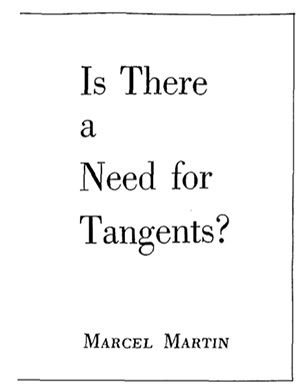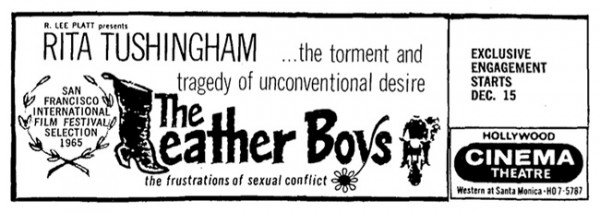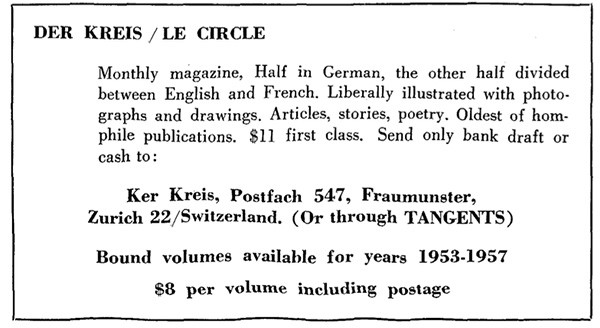Is there a need for Tangents?
Tangents
December 1965
Vol. 1 No. 3
Essay by Ross Ingersoll as “Marcel Martin”
As originally printed in the December 1965 issue of Tangents
In the issue of Saturday Review for October 9th there appeared an article by Robert K. Woetzel entitled “Do Our Homosexuality Laws Make Sense.” This is but the latest of a number of articles on homosexuality which have appeared, in the last few years, in the most reputable and distinguished periodicals in the United States. We have been appreciative of all of these articles and have, in our pages, consistently commended the authors and publishers for their attention to a once tabooed subject. We hope there is a trend here to greater freedom in publishing material of all kinds and we hope, particularly, that there will he an increasing, free, open and unselfconscious discussion of homosexuality in all communications media.
 All of the articles which I have in mind at the moment have been sober and thoughtful, and their authors have tried to present a picture of homosexuality which, if not a particularly happy one, at least avoids the condemnatory tone and prejudice so often reflected by a deliberate choice of derogatory words and attitudes. In my opinion, however, none of these articles, whatever the intention of the author, has succeeded in giving an undistorted picture of homosexuality for the simple reason that all have been written by heterosexuals.
All of the articles which I have in mind at the moment have been sober and thoughtful, and their authors have tried to present a picture of homosexuality which, if not a particularly happy one, at least avoids the condemnatory tone and prejudice so often reflected by a deliberate choice of derogatory words and attitudes. In my opinion, however, none of these articles, whatever the intention of the author, has succeeded in giving an undistorted picture of homosexuality for the simple reason that all have been written by heterosexuals.
In most cases the author finds some obvious way of conveying the information to the reader that he is, himself, heterosexual, but even if he did not it would he apparent to any homosexual reader. I suppose that it is important that he do this, for I am quite sure that none of these magazines would have published these same articles had they been written from other than a clearly heterosexual point of view. I may he wrong, but I find that my opinion is shared by other editors of this magazine.
Pleased as I am to see articles such as these in our national magazines, I am distressed to see them continually fall short of the kind of truth and understanding which they should attain, and which we hope will some day exist between the homosexual and the heterosexual worlds. Why should there be this gap? Certainly there is fault on both sides. Clearly, I think, the heterosexual press is not yet ready to open its pages to admitted homosexual writers or to any statement of the homosexual viewpoint which would appear to encourage or even condone homosexuality. But the homosexual does so little to help or to try to help. Few capable homosexual writers are willing to risk declaring themselves openly in the public press by expressing any kind of truth which would really indicate that the author knew what he was talking about. Particularly is this true of those who have the most to lose—those who have the intellectual background or professional status which would make their words effective. We know that there are homosexual psychologists and psychiatrists, biologists and sociologists, but apparently these are the very people who dare not or will not express themselves on subjects of homosexual interest. To be sure they could write under a pseudonym, but editors of reputable magazines are justifiably unwilling to accept controversial material from contributors who dare not stand behind their words. In a very real sense, then, the homophile movement loses by default!

Perhaps someday in the not too distant future there may be a breakthrough on both sides, and homosexuals will dare to express themselves in a serious way, and heterosexual editors will dare to publish them. But that day has not yet arrived, so until it does it is clear that if there is to be any really accurate presentation of the homosexual as he exists in present-day society, of his problems, his struggles, his aspirations, and his real way of life, there must be at least one magazine which will and can publish the writing of admitted homosexual writers and still, as part of a community of interests, protect and defend those writers from a hostile society.
To be effective, such a magazine should be a quality magazine—it should have standards as high as those of any other reputable magazine. It should expect to be both literate and literary. It must expect to accomplish something. But ideals and highsounding aims are not enough; to survive in an economic and competitive world any magazine must find an audience, which means that it must be both readable and interesting. Not even the cause it supports will support it if it fails in this last respect. This is the magazine Tangents hopes to become.
But a homosexual magazine has other obligations as well. It must consider that one of its primary obligations is to provide expression for the man or woman who cannot find expression elsewhere; it must be able to give those writers who feel a need to deal with the aspects of life they know best a market which the standard press cannot yet provide. A homophile press should, too, have in mind the need to provide the interested heterosexual reader with a really accurate presentation of homosexual life—both the good and the bad, sordid and the beautiful. And too, since it does represent a special interest group, it should hope to bring aid, comfort, pleasure and amusement to the homosexual himself. A good homosexual magazine cannot fail to do any of these things.
Like Playboy, you see, we have our own philosophy. It has been a long time getting to the point where it could give rise to a policy statement, but the time has come.
There would still be no real excuse for Tangents if I thought that the barrier to understanding between the heterosexual and the homosexual were absolutely impenetrable. I do not think that this is true, but so long as such real differences as do exist between these two classes of society are reinforced by legal and social dis- crimination and popular prejudice, I am afraid that it is nearly so. Every one falls into one group or the other and it is difficult to achieve a mutual understanding. Intellectual understanding is not, for those who try, particularly difficult, and many heterosexual writers have actually attained to this. It is the emotional or subjective understanding which comes so slowly. It is the trivia of behavior which cause the greatest difficulty. Many people on all social and educational levels seem to be able to accept the fundamental idea of a variance in sexual tastes. Perhaps this is because almost everyone, whether homosexual or heterosexual, has one time or another felt a sexual or an emotional attraction for the “wrong” sex, and, of course, may have had an actual sexual experience which lay outside his own norm. As a result, it seems to me, it isn’t so much our actual sexual appetites which offend the heterosexual as it is the way we go about satisfying them. And this too, works both ways. The homosexual is, of course, far ahead of the heterosexual in understanding. After all he has been reared in a heterosexual society; he is the product of a heterosexual union; he has been indoctrinated from birth with the idea that “to live happily ever after” is to marry—heterosexually. He is besieged with propaganda (and I use this word advisedly, for there is no greater or more persistent propaganda effort in the world today than that in favor of heterosexual sex). Consider the media—home, family, church, state, schools, literature, movies, television, and, the most persuasive of all, commercial advertising. It’s only the rarest homosexual who has never dated, who has not taken for granted that someday he would marry, who has not made the effort to fall in love in orthodox fashion, and who has not at least once had or attempted heterosexual sex. How many heterosexual writers have ever considered the homosexual drive in the light of these overwhelming influences? How can any thinking person consider homosexuality a mere whim, a self-indulgence, or even a perversion when it survives against such odds?
Obviously, the homosexual can have, must have, and does have an understanding of the heterosexual world which the heterosexual, unfortunately, can never hope to attain of the homosexual world. The homosexual, consequently, can have and does have a far richer and greater experience of life than most of his fellow men. I might say, as a natural consequence that the homosexual is really a fortunate person. I won’t actually say this, because to do so would bring down upon me the wrath of heterosexual society. Nor is it, in the long run, true; we do have an unusual experience of life, but we must pay for everything we get, and if the homo- sexual experiences life to a degree unknown by his heterosexual companions, he pays for it he pays because he is different from the majority which surrounds him. Genius may lie in being different, but I doubt that serenity and fairy book happiness ever do.

But, real happiness can be claimed by the very few, homosexual and heterosexual alike, and it is indeed denied anyone who has not learned to live with himself on his own terms. Heterosexuality and conformity are not, in themselves, any more the keys to happiness than are homosexuality and deviation. Understanding, both of one’s self and others, and wisdom, are, I do think, the real keys to happiness. Right action is, in the long run, the only answer, but everyone must realize that what is right for one is not right for the other.
Perhaps the heterosexual writers I have been referring to in this article have been trying, in their own way, to perform the right action. Why, then, have they failed?
In my opinion they simply do not know enough and do not use the right approach in trying to learn more. Whenever a heterosexual writer is looking for dirt, for the sensational, the lurid, the shocking, he betakes himself at once to the only real source—the homosexual. I suppose he reasons that anything derogatory the homosexual must say must be true, otherwise he would not say it. But, when he is trying to unearth sober, redeeming fact, where does he go? Rarely, if ever, to the homosexual but they have learned from other “experts” and which keep on reappearing in every piece of serious writing about homosexuality.
“Do Our Homosexuality Laws Make Sense” is a fine piece of writing. Mr. Woetzel takes the stand that they indeed do not make sense. We agree with him wholeheartedly, but when he attempts to explain why he makes the statements he does he gets off the track. Using Mr Woetzel’s article as a guide, I shall, in a subsequent article, attempt to point out some of the things that heterosexuals do not know or understand about homosexuals.


